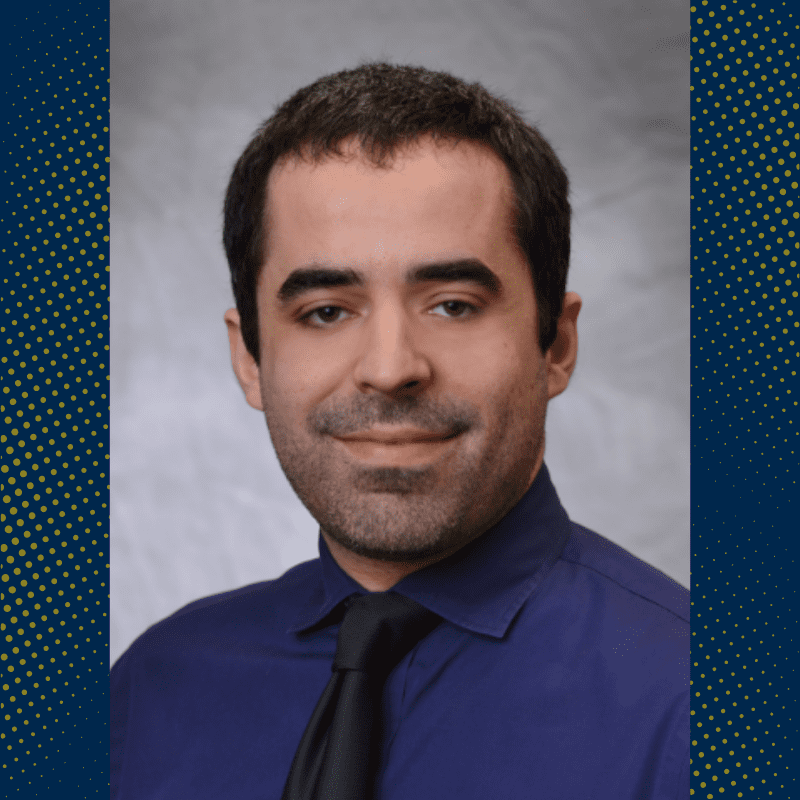Faculty Affiliate Members

Daniel Almirall, PhD | Institute for Social Research
Dr. Almirall is a statistician and intervention scientist who develops methods to form evidence-based adaptive interventions, including just-in-time adaptive interventions. Adaptive interventions are used to guide individualized intervention decisions for the on-going management of chronic illnesses or disorders such as drug abuse, depression, anxiety, autism, obesity, or HIV/AIDS. More recently, Danny has been developing methods to inform the construction of optimized multilevel adaptive implementation strategies (MAISYs) using a variety of trial designs, including Multilevel Implementation, Sequential, Multiple-Assignment, Randomized Trials (MI-SMARTs).

Jill B. Becker, PhD | Department of Psychology
Dr. Becker received a M.A. in Human Development from the University of Kansas and her Ph.D. in Neuroscience from the University of Illinois, Urbana-Champaign. After doing a post-doc at University of Michigan with Terry E. Robinson, she joined the UM faculty in 1987. Dr. Becker is the Patricia Y. Gurin Collegiate Professor of Psychology, Research Professor in Psychiatry and the Michigan Neuroscience Institute, and is a Senior Neuroscience Scholar, University of Michigan, Ann Arbor. Dr. Becker is Editor-in-Chief of the journal Biology of Sex Differences and the author of over 160 articles or chapters and has had numerous grants from the National Institutes of Health and the National Science Foundation. Dr. Becker’s research of the last 30 years investigates the developmental and neural mechanisms underlying sex differences in release of the neurotransmitter, dopamine, and how this is important for motivated behaviors in the laboratory rat. She is the recipient of numerous awards including the Distinguished Faculty Achievement Award from the University of Michigan, the Bernice Grafstein Award for Mentoring from the Society for Neuroscience and the Health Education Visionary Award from the Society for Women’s Health Research.

Kent Berridge, PhD | Department of Psychology
Research in the Berridge lab uses optogenetic techniques in affective neuroscience studies of the brain mechanisms that control and focus excessive motivation to pursue intravenous opioid drugs versus natural rewards.

Mark C. Bicket, MD, PhD | Department of Anesthesiology
Mark C. Bicket, MD, PhD, is the Co-Director of the Michigan Opioid Prescribing Engagement Network (OPEN) and an Associate Professor in the Department of Anesthesiology at the University of Michigan School of Medicine. Dr. Bicket has served on committees for the National Academy of Medicine, state public health agencies, and numerous professional organizations. He holds board certifications in anesthesiology and pain medicine and received an M.D. and Ph.D. from the Johns Hopkins University. His research spans clinical trials, health services, and policy analysis related to opioid prescribing, opioid alternatives, and risky opioid use.

Kevin Boehnke, PhD | Department of Anesthesiology
Kevin Boehnke is a Research Assistant Professor in the Department of Anesthesiology and the Chronic Pain and Fatigue Research Center. Kevin received his doctorate from the University of Michigan School of Public Health in Environmental Health Sciences in 2017. He is also a yoga instructor. His current research focuses on therapeutic applications of cannabis and psychedelics. His goal is to rigorously assess appropriate use of these substances and to help address the public health harms caused by their criminalization.

Amy Bohnert, PhD, MHS | Department of Anesthesiology
Dr. Bohnert is a Professor at the University of Michigan in the Departments of Anesthesiology (primary), Psychiatry, and Epidemiology and co-director of the Opioid Research Institute. She is also co-director of the Michigan Opioid Collaborative within the Michigan Overdose Prevention Engagement Network (OPEN), which seeks to improve access and quality of treatment for opioid use disorders throughout Michigan through community outreach and clinician education. Dr. Bohnert focuses her research on epidemiology and brief interventions regarding chronic pain, opioid misuse, overdose, substance use and related disorders. Learn more about Dr. Bohnert

Tudor Borza, MD, MS | Department of Urology
Dr. Borza is a urologic oncologist and health services researcher in the University of Michigan Department of Urology. His research focuses on surgical quality and spans from data analysis to intervention development and implementation. He has a particular interest in improving opioid stewardship in surgical patients by leveraging surgical collaboratives to facilitate implementation of multi-level interventions. He currently serves as the Director of Opioid Stewardship for the Surgical Collaborative of Wisconsin.

Chad Brummett, MD | Department of Anesthesiology
Dr. Brummett is the Bert N LaDu Professor of Anesthesiology at the University of Michigan and co-director of the Opioid Research Institute. Dr. Brummett is also the Co-Director of the Opioid Prevention Engagement Network (OPEN) at the University of Michigan, which aims to apply a preventative approach to the opioid epidemic in the US through appropriate prescribing after surgery, dentistry, and emergency medicine. Dr. Brummett’s research interests include predictors of acute and chronic post-surgical pain and failure to derive benefit for interventions for interventions and surgeries primarily performed to treat pain. Dr. Brummett is specifically interested in the impact of a fibromyalgia-like or nociplastic pain phenotype on outcomes. Learn more about Dr. Brummett

Brian Callaghan, MD, MS | Department of Neurology
I am a Professor of Neurology who is interested in neuropathy and headache. I was the lead facilitator of the American Academy of Neurology guidelines for the treatment of painful diabetic neuropathy, which recommended against opioids in this population. One of my goals is to increasing the evidence for the treatment of neuropathic pain with the goal of reducing opioid use. I am also studying ways to better understand problematic opioid use patterns and predict which patients are likely to have adverse events from opioids.

Kao-Ping Chua, MD, PhD | Department of Pediatrics
Dr. Kao-Ping Chua is a primary care pediatrician and health policy researcher in the Department of Pediatrics and the Susan B. Meister Child Health Evaluation and Research Center at the University of Michigan Medical School. After completing his pediatrics residency at Boston Children’s Hospital and Boston Medical Center, he obtained a Ph.D. in health policy from Harvard University with a concentration in evaluative sciences and statistics. Dr. Chua’s research focuses on improving the quality of opioid prescribing and on evaluating the effects of policies on this prescribing. He has published several key studies on pediatric opioid prescribing, including a study describing the prevalence, prescribers, and safety of opioid prescriptions to children and young adults, as well as a national study identifying opioid prescribing patterns associated with opioid overdose among adolescents and young adults. He is funded by multiple R01 grants from the National Institute on Drug Abuse. Dr. Chua also serves as the Institute’s Research and Data Domain co-director.

Karen Cooper, MD | Department of Otolaryngology-Head and Neck Surgery
Dr. Cooper practices in the Division of Pediatric Otolaryngology-Head and Neck Surgery at Michigan Medicine where she cares for children with common head and neck problems who often require surgical intervention. Many of these children and their families face surgery without a clear understanding of what their recovery might involve in terms of pain or how to address their pain outside of an opioid prescription. Her work with the Opioid Prescribing Engagement Network (OPEN) stems from her desire to prepare kids and their families for their postoperative course in a better and safer way, by offering education on methods to control post-operative pain including over-the counter medications and non-medication strategies, explanation of the risks of opioids, and safe storage and disposal options. Dr. Cooper hopes to help those who care for children following surgery to share a common message about acute postoperative pain, opioid safety and disposal options. Her background is in patient safety and quality improvement, and her research interests are on pain management following surgery and use of prescribed opioids, so prescribing guidelines can be developed for providers based on actual patient use.

Lara Coughlin, PhD | Department of Psychiatry
Dr. Coughlin’s work focuses on the intersection of behavioral economics, health equity, and substance use, including opioid use. This includes designing and implementing adaptive interventions to enhance the quality, access, and reach of substance use care to reduce health disparities, including improving access to substance use care in rural America. I’m particularly interested in understanding the complex interplay between choice preferences and substance use behaviors, applying behavioral economic frameworks to solve addiction-related challenges. By working closely with diverse communities, this work aims to create impactful solutions that address substance use challenges and improve the overall well-being of all individuals and communities.

Gina Dahlem, PhD, FNP-C, FAANP | School of Nursing
Dr. Dahlem is a family nurse practitioner whose clinical focus has been delivering primary care services for complex care populations particularly for people experiencing homelessness. Her research focuses on developing and implementing innovative models of care through community-engaged research to reduce the burden associated with drug overdoses. She is also the co-inventor of Rapid Assessment for Adolescent Preventive Services which is being used worldwide as a screening tool. Dr. Dahlem has led opioid overdose prevention trainings throughout Michigan and nationally for first responders, community laypeople, healthcare providers, and emergency departments. Dr. Dahlem also serves as the Institute’s Community Engagement Domain co-director.

Shelly Flagel, PhD | Michigan Neuroscience Institute
Dr. Flagel is a Professor of Psychiatry, as well as a Research Professor and Co-Director of the Molecular & Behavioral Neuroscience Institute. She is an Associate Member of the American College of Neuropsychopharmacology and a Kavli National Academy of Sciences Fellow. Her research focuses on understanding the behavioral and neurobiological factors that contribute to individual differences in reward learning and susceptibility to addiction. She is specifically interested in the psychological mechanisms that underlie and influence appetitive Pavlovian learning and the neural circuitry involved in these processes.

Samir Gadepalli, MD, MBA | Pediatric Surgery
At University of Michigan, Dr. Gadepalli completed fellowships in both Surgical Critical Care and Pediatric Surgery and is board certified in General Surgery, Critical Care and Pediatric Surgery. His clinical practice encompasses all aspects of pediatric surgery, including minimally invasive surgery, non-cardiac thoracic surgery, neonatal surgery, hepatobiliary and pancreatic surgery, surgical oncology, abdominal, colorectal and genitourinary abnormalities, trauma and critical care. His unique background allows expertise in the critical care needs of the surgical neonatal and pediatric populations, including the use of extracorporeal membrane oxygenation (ECMO) in children.

Jason Goldstick, PhD | Emergency Medicine
Dr. Goldstick is a Research Associate Professor of Emergency Medicine and is the Statistics and Methods Core Director in the CDC-funded Injury Prevention Center at U-M. He has received funding from the CDC and NIH for several projects related to substance use, and is the lead statistician on multiple NIH-funded projects. In addition, he has worked with the CDC using multiple data sources to evaluate changes in opioid and nonopioid pain medication prescribing following the release of the 2016 CDC Guideline for Prescribing Opioids for Chronic Pain. He has also directed a statewide near real-time surveillance system for opioid overdoses in Michigan called the System for Opioid Overdose Surveillance since 2019.

Afton L. Hassett, PsyD | Department of Anesthesiology
Dr. Hassett is a licensed clinical psychologist who is an Associate Professor and Director of Pain and Opioid Research in the Department of Anesthesiology at the University of Michigan. As a principal investigator at the Chronic Pain & Fatigue Research Center, she conducts interdisciplinary research related to exploring the role of cognitive, affective, and behavioral factors in chronic pain populations. She has published over 100 peer-reviewed articles and is a leader in the field of resilience and pain. Her work has focused on exploring the role of positive emotions in people with pain, as well as novel interventions to promote resilience and better pain self-management. Her current research involves developing resilience-enhancing activities to promote the sparing of premature cellular aging in patients with chronic pain (NINR R01 NR017096), testing the mechanisms underlying treatments for chronic low back pain (HEAL BACPAC; NIAMS U19 AR076734) and developing “prehabilitation” programs for anxious surgical patients to optimize outcomes including reducing opioid use (MiCarePath). Dr. Hassett is a Past President of the Association of Rheumatology Professionals – a division of the American College of Rheumatology and the author of Chronic Pain Reset, an innovative pain self-management book for patients and their clinicians released in September of 2023.

Steve Harte, PhD | Department of Anesthesiology
Dr. Harte is a psychobiologist and an Associate Professor of Anesthesiology and Internal Medicine with 25 years of experience studying and teaching pain science. His NIH-funded research program leverages preclinical models, psychophysics, inflammatory biomarkers, patient-reported outcomes measures, wearables, and functional brain imaging to investigate mechanisms of chronic pain and analgesic treatments. Specific areas of interest include multisensory neural integration, cannabinoids, environmental influences on pain, pain affect, mechanisms of pain modulation, and analgesic drug development. He is a member of several national pain research collaborations, including the Multidisciplinary Approach to the Study of Chronic Pelvic Pain (MAPP) Research Network, the Symptoms of Lower Urinary Tract Dysfunction Research Network (LURN), the HEAL BACPAC and BEST initiatives, the recently completed AURORA Study on trauma, and the Common Fund Acute to Chronic Pain Signatures Program where he leads the development and implementation of multi-site quantitative sensory testing (QST). Dr. Harte is a faculty affiliate of the U-M Neuroscience Graduate Program, Michigan Neuroscience Institute, and Sensory Science Initiative. He is Director of the Postdoctoral Translational Scholars Program at the Michigan Institute for Clinical and Health Research (MICHR) and Co-Director/Co-PI of the HEAL National K12 Clinical Pain Career Development Program. Lastly, he is engaged in the development of novel medical and research devices and e-Health delivery applications, and is Co-Founder/Chief Scientific Officer of Arbor Medical Innovations, LLC. Dr. Harte holds several patents for pain measurement and wearable technology resulting from this work.

Lori L. Isom, PhD | Department of Pharmacology
Dr. Isom is the Maurice H. Seevers Professor and Chair of the Department of Pharmacology, Professor of Molecular and Integrative Physiology, and Professor of
Neurology at the University of Michigan Medical School. She serves as co-chair of the Dravet Syndrome Foundation Scientific Advisory Board and served as a Board member of the AES. She has received awards for research and mentoring, including a NINDS Javits R37 MERIT award and the University of Michigan Rackham Distinguished Graduate Mentoring Award. She is co-PI of the NINDS-funded EpiMVP Center Without Walls. Her research program focuses on voltage-gated sodium channel function and the roles of sodium channel gene variants in developmental and epileptic encephalopathy. Her lab investigates SCN1A, SCN1B, and SCN8A variants in mouse models and in human induced pluripotent stem cell neurons and cardiac myocytes. Most recently, she collaborated with Stoke Therapeutics to develop the first antisense oligonucleotide precision therapeutic agent for Dravet syndrome, which is now in clinical trials. Dr. Isom is a Fellow of the American Association for the Advancement of Science, a Fellow of the American Epilepsy Society, and a Fellow of the American Society for Pharmacology and Therapeutics. She was elected to the National Academy of Medicine in 2021.

Mary Janevic, PhD, MPH | Department of Health Behavior and Health Education
Mary Janevic is a Research Associate Professor in Health Behavior and Health Education at the University of Michigan School of Public Health. She conducts community-engaged research on behavioral interventions for chronic pain among older adults in marginalized and minoritized communities, and seeks to understand mechanisms and solutions for pain inequities.

Keith Kocher, MD, MPH | Emergency Medicine
Dr. Keith Kocher, MD MPH, is a practicing emergency physician, associate professor in the Departments of Emergency Medicine and Learning Health Sciences at the University of Michigan, research investigator at the Ann Arbor Veterans Affairs Center for Clinical Management Research, and a health services researcher affiliated with the Institute for Healthcare Policy and Innovation. He is also the Director of the Michigan Emergency Department Improvement Collaborative, a network of hospitals across the state of Michigan dedicated to improving the quality of emergency care for all. His work focuses on optimizing the value of emergency and acute care delivery, performance measurement, quality improvement, and implementation of best practices. He has studied the implementation of harm reduction interventions for opioid use disorder in the emergency department setting, including increasing capacity to prescribe buprenorphine and building naloxone dissemination programs for those at risk of overdose.

Sarah Krein, PhD, RN | Internal Medicine
Dr. Krein is a Research Health Scientist/Research Career Scientist with the Department of Veterans Affairs (VA) Ann Arbor Healthcare System Center for Clinical Management Research. She is also a Research Professor of Internal Medicine, with an adjunct appointment in the School of Nursing, and the Rensis Likert Collegiate Professor at the University of Michigan. She has a clinical background in nursing and a PhD in Health Services Research. During her more than 20 years as a research scientist, Dr. Krein has been involved in research funded by the VA, NIH, AHRQ and CDC, to enhance patient safety as well as studies focusing on the management of complex chronic conditions, such as chronic pain.

Pooja Lagisetty, MD, MSc | Internal Medicine
Dr. Pooja Lagisetty is an Associate Professor of Internal Medicine and practicing physician with a focus on addressing access barriers and developing interventions to better treat chronic pain and addiction across medical settings. Dr. Lagisetty received her medical degree from Johns Hopkins School of Medicine, completed her internal medicine residency at Massachusetts General Hospital, and received her master’s degree in health services research via the Robert Wood Johnson Clinical Scholars Program at the University of Michigan. She also holds a joint appointment in the Center for Clinical Management and Research at the Ann Arbor VA and is a contributing member at the Institute for Healthcare Policy and Innovation. Clinically, she is boarded in both Internal Medicine and Addiction Medicine and treats patients across the spectrum of chronic pain and addiction. She has co-led the development of the Michigan Medicine Inpatient and Emergency Department Addiction Consultation Team and the curricula around opioid use disorder for the University of Michigan Medical students. Her research has been influential in understanding stigma and disparities for individuals with pain and addiction. Specifically, her work has highlighted treatment access barriers for individuals with chronic pain following policies aimed at reducing prescription opioid supply and racial disparities in the receipt of medications for opioid use disorder. She has been funded by multiple federal agencies including NIDA, SAMSHA, and the VHA and also by foundations including the Michigan Health Endowment Fund and Blue Cross Blue Shield Foundation of Michigan. Dr. Lagisetty also serves as the Institute’s Research and Data Domain co-director.

Erica Levitt, PhD | Department of Pharmacology
Dr. Erica Levitt’s research interests are in understanding the mechanisms underlying opioid-induced respiratory depression. We use a variety of cellular and systems neuroscience approaches in rodent models to understand how opioids alter the neurons in the brainstem that control breathing, including brain slice electrophysiology, circuit tracing, optogenetics, single unit and whole nerve recordings from a unique preparation with an intact respiratory network and in vivo-like respiratory cycle, and breathing measurements in awake animals. Dr. Levitt also serves as the Institute’s Research and Data Domain associate director.

Sean Esteban McCabe, PhD | Institute for Research on Women and Gender
Dr. Sean Esteban McCabe is a Professor (Tenured) and the Director of the University of Michigan Center for the Study of Drugs, Alcohol, Smoking and Health (DASH Center) in the Department of Health Behavior and Biological Sciences in the School of Nursing. He has a broad background in education, epidemiology, psychology, and social work. Dr. McCabe has clinical experience working with adolescents and adults on issues related to ADHD, prescription drug use and misuse, and substance use disorders in a wide range of settings (eg, community, corrections, healthcare, schools). He has extensive experience conducting survey research and secondary data analyses related to prescription drug use and misuse, polysubstance use, and substance use disorders using longitudinal designs. He served as an expert consultant for the substance use survey modules for the Monitoring the Future study and the National Survey on Drug Use and Health. Dr. McCabe has successfully led 13 FDA- and NIH-funded projects as Principal Investigator. He has served as the Associate Editor and Editor for substance use journals and produced over 265 peer-reviewed papers. Dr. McCabe’s research has had direct implications for policy and clinical practice as reflected in the CDC Guidelines for Prescribing Opioids and the FDA Drug Safety Communication to improve safe use of prescription stimulants for ADHD. Dr. McCabe has teamed up with Dr. Luisa Kcomt at Wayne State University and over 30 community, academic, and health care partners on developing a new trauma-Informed program for children aged 5-17 years and their families who have experienced the death of a parent or significant person from an opioid/other drug overdose within the past 10 years. Hope HQ is currently focused on children and families in southeast Michigan where the majority of drug overdose deaths in the state occur. Our multidisciplinary team is currently building the program and fundraising to expand year-round services for families throughout the state and beyond.

Inbal Billie Nahum-Shani, PhD | Institute for Social Research
Dr. Nahum-Shani’s primary research interest is harnessing adaptive interventions to transform health care. Adaptive interventions address the changing needs of individuals by modifying their treatment based on dynamic information about their state and progress. An important focus of her work is the Just-In-Time Adaptive Intervention (JITAI), a special type of adaptive intervention that leverages powerful mobile and sensing technologies to adapt the delivery of support in real-world settings—in near real-time. Her work is highly multidisciplinary, spanning behavioral health and applied psychology, while also being tightly integrated with advanced research methodology. She recently pioneered the development of a new experimental design—the hybrid experimental design (HED)—to help health scientists optimize the integration of human-delivered (e.g., coaching session) components with digital (e.g., mobile-based) components, which necessitates adaptation on multiple timescales.

Romesh Nalliah, DDS, MHCM | Department of Cariology (Dentistry)
Dr. Nalliah is the Associate Dean for Patient Services at the School of Dentistry and oversees all patient care. Dr. Nalliah’s expertise is in process evaluation, and his research represents evaluations of healthcare processes, hospital processes and educational processes. Dr. Nalliah’s goal is to improve healthcare delivery systems by optimizing processes, minimizing inefficiencies, reducing healthcare bottlenecks, and increasing quality, with the aim of developing a more patient-centered, coherent healthcare system. Dr. Nalliah has focused on safe opioid prescribing by dentists and has identified various trends and patterns in prescribing that were previously unknown.

Thuy Nguyen, PhD | Department of Health Management and Policy
Dr. Nguyen is a health services researcher and health economist with doctoral training in development economics and post-doctoral training in health economics. She is interested in health services research of pharmaceutical related policy to address the US opioid epidemic. Her research has focused on treatment access for opioid use disorder, prescribing behavior, incentive issues of medical providers, and using novel data to address pressing knowledge gaps.

Megan Patrick, PhD | Institute for Social Research
Dr. Patrick is Principal Investigator of the Monitoring the Future Panel Study, which is a national study following former school age Monitoring the Future participants from ages 18 to 65 since 1976, and co-investigator on the Monitoring the Future Main study. Her published research focuses on the development of substance use and consequences across the lifespan. Her interests include motivations for substance use, the prevention of health risk behaviors, statistical methods for modeling behavior and behavior change, and mobile and web-based survey methodology. She has been the PI of 10+ NIH-funded projects and Co- Investigator on many others. Her other current NIH-funded R01 projects focus on high-intensity drinking, simultaneous alcohol and marijuana use, and adaptive interventions to reduce consequences of young adult substance use.

Alex Peahl, MD, MSc | Department of Obstetrics and Gynecology
Alex Peahl, MD, MSc is an Assistant Professor in the Department of Obstetrics and Gynecology at the University of Michigan. She is also the obstetrics lead for the Partnering for the Future Clinic, an interprofessional clinic that cares for birthing people with opioid use disorder and chronic pain. Dr. Peahl’s clinical work and research focus optimizing pain management in pregnancy and the postpartum period through opioid-sparing approaches. She is currently leading development of the COMFORT (Creating Optimal pain Management FOR Tailoring interventions in pregnancy and postpartum) guidelines, an FDA sponsored project to create comprehensive, patient-centered, equitable pain management across the pregnancy episode that minimizes the risks of opioid medications. Her research spans consensus methodology, health services research, and assessment of patients’ experiences through quantative and qualitative approaches.

Ponni Perumalswami, MD, MSCR | Medicine, Gastroenterology and Hepatology
Dr. Perumalswami is an Associate Professor of Internal Medicine in the Division of Gastroenterology and Hepatology at the University of Michigan, Director of the Liver Clinic and a Staff Gastroenterologist at the VA Ann Arbor Healthcare System and Investigator in Center for Clinical Management Research in the VA Health Services Research and Development. Dr. Perumalswami also serves as the Institute’s Community Engagement Domain co-director.

Jennifer Pierce, PhD | Department of Anesthesiology
Jennifer Pierce, Ph.D., is a social psychologist and Research Assistant Professor in the Department of Anesthesiology at the University of Michigan. Her research is aimed at understanding the impact of trauma on pain phenotype and pain-related behavior, as well as extending this work to interventions for people with pain and individuals who have experienced trauma.

John Piette, PhD, MS | Internal Medicine
Dr. Piette’s research focuses on developing and evaluating novel strategies for using patient-facing health technology to improve the accessibility and quality of care for patients with chronic pain, medical illnesses such as diabetes, substance abuse disorders, and mental health disorders. Recent work focuses on the use of digital tools to make psychotherapeutic interventions and behavior change support more accessible to the people who need them, including through the use of artificial intelligence to target scarce resources. In addition to work in the US Department of Veterans Affairs healthcare system and other safety net systems here in the US, Dr. Piette is actively engaged in collaborative projects in Latin America to improve access to care and improve patient self-management support. Current projects include colleagues in Mexico, Honduras, Bolivia, and Colombia, with an emphasis on improving services for people impacted by violence and mental illnesses.

Lisa Prosser, PhD, MS | Department of Pediatrics
As Associate Vice President for Research-Health Sciences, Dr. Prosser supports the research efforts of faculty in the health sciences across multiple schools and units. She also works collaboratively with the OVPR Leadership Team to develop new initiatives to catalyze and support research across the schools and units at U-M. Dr. Prosser is the Marilyn Fisher Blanch Research Professor of Pediatrics. She holds a joint appointment in the Department of Health Management and Policy at the School of Public Health. Her research focuses on measuring the value of childhood health interventions using methods of decision sciences and economics. She has worked closely with the Centers for Disease Control and Prevention and the Maternal Child and Health Bureau (HRSA) on research that has informed national vaccine policy and newborn screening recommendations. Dr. Prosser has contributed to faculty development programs at the department, school, and institutional level.

Max Shtein, PhD | Department of Materials Science and Engineering
Dr. Shtein received his Baccalaureate at UC Berkeley (1998) and Ph.D. at Princeton University (2004) in Chemical Engineering. During his PhD he co-invented a number of technologies, including methods of manufacturing emerging display technologies (OLEDs). He joined the University of Michigan in 2004, serving as Professor in MSE, Ch.E, Applied Physics, Entrepreneurship, and Art & Design. His awards include: Presidential Early Career Award for Scientists and Engineers (PECASE), College-wide Vulcans Prize for Excellence in Education, MSE Department Achievement Award, Newport Award for Excellence and Leadership in Photonics and Optoelectronics, and Materials Research Society (MRS) graduate student Gold Medal Award. He previously served as Faculty Co-Director of the Undergraduate Program at the UM Center for Entrepreneurship, and is currently serving as co-director for the Michigan Materials Research Institute. He co-founded Arborlight, LLC (a lighting technology company), Sublime, LLC (a biomedical technology company), and co-authored the book Scalable Innovation (published by Taylor & Francis). Some of his current research attempts to address the challenges of drug delivery, patient adherence to medical treatment, health monitoring, medication safety, affordability and scalability of healthcare solutions.

Clayton J. Shuman, PhD, MSN, RN | School of Nursing
As a health services researcher, implementation scientist, and neonatal intensive care nurse, Dr. Shuman focuses on improving care and outcomes for those affected by perinatal substance use. He develops and tests innovative methods and approaches, like art-based interventions, to address stigma surrounding substance use and improve implementation of evidence-based practices.

Michael A. Smith, PharmD, BCPS | College of Pharmacy
Dr. Smith’s research interests include the safe and effective use of analgesics in centralized pain, older adults with and who survive cancer, appropriate use of medications in these vulnerable patients, and the expansion of clinical pharmacist scope of practice. He is a Research Health Scientist within the Geriatric Research Education and Clinical Center of the Ann Arbor VA Medical Center He is also a Clinical Pharmacy Specialist in Pain and Palliative Care at the University of Michigan Health, where his clinical responsibilities include serving patients with serious or life-limiting illnesses and helping optimize their symptom management.

K. Elizabeth Speck, MD | Department of Surgery
Dr. K. Elizabeth Speck is an academic pediatric surgeon and clinical outcomes researcher with a focus on minimally invasive gastrointestinal, colorectal, and thoracic surgery. She has dedicated her life to caring for children and their families, and this includes minimizing long-term effects of opioids by avoiding their use whenever possible. To this end, she implemented the first ERAS ® Protocol at Mott Children’s Hospital in pediatric surgical patients for Pectus Repair that prioritizes multi-modal pain therapy with an aim to specifically avoid opioids.

John Traynor, PhD | Department of Pharmacology
As a pharmacologist and medicinal chemist Dr. Traynor’s work aims to contribute a basic understanding of opioid systems and to use this information to develop novel medications targeting this system. To this end we study interactions of opioids with their receptors, cellular signaling mechanisms and behavioral effects of opioid drugs and endogenous opioid peptides. The aim of our studies is to identify novel targets for clinical intervention in opioid dependent conditions. The long-term goal is to identify molecules that interfere with these targets as potential medications to manage opioid use disorder, opioid overdose, and to provide effective and safer pain therapeutics.

Deborah Wagner, PharmD | College of Pharmacy
Deborah Wagner, PharmD is a clinical professor for the University of Michigan College of Pharmacy a clinical professor for the Department of Anesthesiology in the School of Medicine. She received her PharmD degree from the University of Michigan College of Pharmacy and is a Fellow of the American Society of Health System Pharmacists. Dr. Wagner is the current pediatric safety coordinator for the Children’s and Women’s Hospital at Michigan Medicine. Dr. Wagner provides pain management consultation for the pediatric acute pain service has developed standardized pain management strategies for intravenous acetaminophen, elastomeric pain pumps, low dose lidocaine and ketamine infusions to enhance multimodal analgesia. She participates in the medication safety taskforce within the Department of Anesthesiology develops clinical practice guidelines for the department and chairs the Pediatric Medication Safety Committee.

Jennifer F. Waljee, MD, MPH | Department of Surgery
Jennifer F. Waljee, MD, MPH is a Co-Founder and Co-Director of the Opioid Prescribing Engagement Network (OPEN) and the George D. Zuidema Endowed Professor of Surgery in the Department of Surgery. She also serves as the Director of the Center for Healthcare Outcomes and Policy, and is on the Institute for Healthcare Policy and Innovation Leadership Team. Dr. Waljee is a board-certified general surgeon, plastic surgeon, and hand surgeon, and her research focuses on the optimization of opioid prescribing during surgical care and creating best practices for caring for individuals with substance use disorder during surgical care.

Maureen Walton, MPH, PhD | Department of Behavioral Health Technology Innovations
Maureen Walton MPH, PhD, is a community psychologist who conducts community engaged research testing early interventions focusing on opioids, alcohol, cannabis, and/or violence among adolescents and young adults. She has expertise in working with partners to harness digital technologies to optimize delivery of adaptive interventions. Recent lines of collaborative research include a randomized controlled trial testing telehealth and messaging interventions to prevent opioid misuse. She is particularly interested in innovative designs, such as sequential multiple assignment randomized trials (SMARTs), micro-randomized trials (MRTs), and hybrid experimental designs.

Golfo Tzilos Wernette, PhD | Family Medicine
Golfo Tzilos Wernette, Ph.D. is an Associate Professor in the Departments of Family Medicine and Psychiatry. She is also a licensed clinical psychologist at the Ypsilanti Health Center where she provides short-term psychological intervention to adults in the community seeking primary care services. Her clinical research interests include technology-delivered approaches for health promotion and the reduction of health risk behaviors (e.g., alcohol/drug use, STIs/HIV risk behaviors) among vulnerable populations.

Kara Zivin, PhD, MS, MA, MFA | Department of Psychiatry
Dr. Zivin is a health services and policy researcher who uses social science and public health tools to improve health and functional outcomes for vulnerable populations with mental health and substance use disorders (behavioral health conditions), including pregnant and postpartum women, Veterans, and older adults. Her current work includes the BIRCH project, which assesses the impact of behavioral health policy changes on opioid prescriptions, diagnosed opioid use disorders, and prescription treatment for those disorders. She also co-leads work on behalf of the state of Michigan for the Medicaid Outcomes Distributed Research Network (MODRN) state-university partnership that examines the quality of opioid use disorder treatment for Medicaid Enrollees.